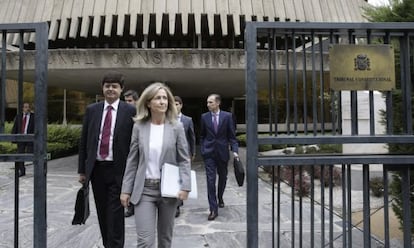The key points of the government appeal
Executive argues that a referendum in Catalonia would deny the remainder of Spaniards their rights

Catalonia cannot hold a referendum on independence because it does not have sovereignty; and what’s more, if it were to do so, it would be negating the sovereignty rights of the rest of the Spanish people. Those are the fundamental arguments of the appeal filed today by the government with the Constitutional Court against a decree signed on Saturday by regional premier Artur Mas, which calls Catalan citizens to the polls on November 9.
The central government of Prime Minister Mariano Rajoy is arguing that the decree violates 13 articles of the Constitution and six of the Catalonia statute, which sets out the devolved powers of the northeastern region. It also points out that there are already a number of Constitutional Court rulings that have denied autonomous regions the right to call a vote of this type. What’s more, it underlines the fact that “autonomy is not sovereignty.” The following are the principal arguments from the 22-page appeal.
There can only be a political project if it respects the law. The government cites arguments already used by the Constitutional Court in the past, in particular a 2008 ruling that quashed an attempt by the Basque Country government to hold a similar vote, as well as the striking down of a declaration of sovereignty passed by the Catalan parliament in 2013. These sentences from the court made clear that asking citizens about independence or a change in the state model affects “the fundamentals of constitutional order,” and that this can only be done via the “established routes:” i.e. via reforms to the Constitution leading to a referendum in all of Spain. The decree signed by Mas exceeds those constitutional limits, the appeal argues.
A “damaging” question. The decree, the government continues, violates several articles of the Constitution given that the questions that will be asked at the polling stations – “Do you want Catalonia to be a state?” and then, if the answer is affirmative, “Do you want that state to be independent?” – are “damaging” to the indivisible unity of the Spanish nation. What’s more, the government argues that the Catalan regional government is claiming that this non-binding vote is “not an actual referendum,” when in fact, given that it is “a political decision of special importance,” it is as such, and also excludes the rest of Spain’s citizens from the decision-making process.
Sovereignty limits. “A constitutional reform that involves a substantial change to the state model must be the product of a decision made by the Spanish people,” the appeal reads. “The call to vote does not meet any of the state regulation in terms of referendums,” it continues. The aforementioned ruling of the Constitutional Court regarding Catalonia’s declaration as being a nation is cited: Catalonia, it read, “is legally sovereign,” and an “autonomous region cannot unilaterally call a referendum on self-determination to decide upon its integration within Spain.”
The rights of a minority deny the rights of the majority. Allowing the regional government to call a vote, the government argues, would have the following consequence: “It would mean that a part of the Spanish people, in this case Catalonia, could, in theory, voice their opinion on the opening of a process” of independence that would exclude the rest of the population. That’s to say, that by recognizing the “right to decide” of one part of the Spanish people, the rest would be denied that right.
The referendum census. The creation by the regional government of a “participation register,” as a kind of census for the vote, “manifestly” violates the exclusive powers of the state concerning general elections and electoral census, the appeal argues, and also violates “basic data protection laws.”
The regional government is not meeting its responsibilities as an institution. The government points out that Spanish law states that “citizens and public powers are subject to the Constitution and ordinary laws.” As such, the appeal argues, “by approving the decree questioned here, the Catalan government is failing to adhere to that constitutional responsibility as a public power.”
Tu suscripción se está usando en otro dispositivo
¿Quieres añadir otro usuario a tu suscripción?
Si continúas leyendo en este dispositivo, no se podrá leer en el otro.
FlechaTu suscripción se está usando en otro dispositivo y solo puedes acceder a EL PAÍS desde un dispositivo a la vez.
Si quieres compartir tu cuenta, cambia tu suscripción a la modalidad Premium, así podrás añadir otro usuario. Cada uno accederá con su propia cuenta de email, lo que os permitirá personalizar vuestra experiencia en EL PAÍS.
¿Tienes una suscripción de empresa? Accede aquí para contratar más cuentas.
En el caso de no saber quién está usando tu cuenta, te recomendamos cambiar tu contraseña aquí.
Si decides continuar compartiendo tu cuenta, este mensaje se mostrará en tu dispositivo y en el de la otra persona que está usando tu cuenta de forma indefinida, afectando a tu experiencia de lectura. Puedes consultar aquí los términos y condiciones de la suscripción digital.








































